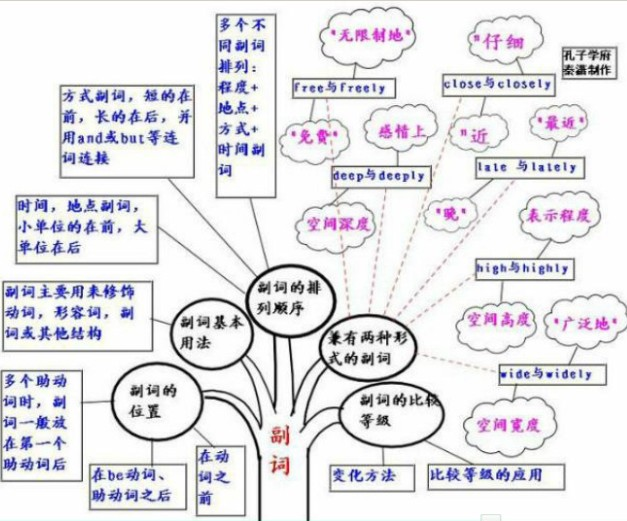本试题 “Bill wasn't happy about the delay of the report by Jason, and _____.[ ]A. I was neitherB. neither was IC. I was eitherD. either was I” 主要考查您对副词
部分倒装
等考点的理解。关于这些考点您可以点击下面的选项卡查看详细档案。
- 副词
- 部分倒装
副词的概念:
副词是指在句子中表示行为或状态特征的词,用来修饰动词、形容词、其他副词、介词短语、非谓语动词乃至整个句子,表示时间、地点、程度、方式等概念。
副词的位置:
1)在动词之前。
2)在be动词、助动词之后。
3)多个助动词时,副词一般放在第一个助动词后。
注意:
a. 大多数方式副词位于句尾,但宾语过长,副词可以提前,以使句子平衡。
如:We could see very clearly a strange light ahead of us.
b. 方式副词well,badly糟、坏,hard等只放在句尾。
如:He speaks English well.
副词的排列顺序:
1)时间,地点副词,小单位的在前,大单位在后。
2)方式副词,短的在前,长的在后,并用and或but等连词连接。
如:Please write slowly and carefully.
3)多个不同副词排列:程度+地点+方式+时间副词。
注意:副词very可以修饰形容词,但不能修饰动词。
改错:(错)I very like English.
(对)I like English very much.
注意:副词enough要放在形容词的后面,形容词enough放在名词前后都可。
如:I don't know him well enough.
There is enough food for everyone to eat.
There is food enough for everyone to eat.
兼有两种形式的副词:
1)close与closely:
close意思是“近”;closely意思是“仔细地”。
如: He is sitting close to me.
Watch him closely.
2)late与lately:
late意思是"晚";lately意思是“最近” 。
如:You have come too late.
What have you been doing lately?
3)deep与deeply:
deep意思是“深”,表示空间深度;deeply时常表示感情上的深度,“深深地” 。
如:He pushed the stick deep into the mud.
Even father was deeply moved by the film.
4)high与highly:
high表示空间高度;highly表示程度,相当于much。
如:The plane was flying high.
I think highly of your opinion.
5)wide与widely:
wide表示空间宽度;widely意思是“广泛地”,“在许多地方”。
如:He opened the door wide.
English is widely used in the world.
6)free与freely:
free的意思是“免费”;freely的意思是“无限制地”。
如:You can eat free in my restaurant whenever you like.
You may speak freely, say what you like.
副词知识体系:

部分倒装的概念:
倒装英语句子的主语通常位于谓语动词之前,这种语序被称为正常语序。但有时出于修辞或某种特殊的语法结构的需要,需要将谓语动词放在主语之前,这种语序则叫倒装语序。主语和助动词倒置叫部分倒装。
部分倒装:
1、含有否定意义的副词位于句首时的倒装:
在正式文体中,never, seldom, rarely, little, hardly, scarcely, no sooner, no longer, nowhere等含有否定意义的副词若位于句首,则其后要用部分倒装:
如:I shall never forgive him./ Never shall I forgive him. 我永远不会宽恕他。
He seldom goes out for dinner./Seldom does he go out for dinner. 他很少出去吃饭。
She hardly has time to listen to music./Hardly does she have time to listen to music. 他几乎没时间听音乐。
He little realize show important this meetingis./Little does he realize how important this meeting is. 他不甚明白这个会议的重要性。
We had no sooner reached the airport than the plane took off./No sooner had we reached the airport than the plane took off. 我们刚到机场,飞机就起飞了。
注:(1)对于not…until句型,当not until…位于句首时,其后的主句要用倒装语序:
如:He didn't leave the room until the rain stopped./Not until the rain stopped did he leave the room. 雨停了之后他才离开这房间。
(2)某些起副词作用的介词短语,由于含有否定词,若位于句首,其后要用部分倒装:
如:On no accounts must this switch be touched. 这个开关是绝不能触摸的。
In[Under] no circumstances will I lend money to him. 无论如何我也不会再借钱给他了。但是,in no time(立即,马上)位于句首时,其后无需用倒装语序:
如:In no time he worked out the problem. 他马上就算出了那道题。
2、“only+状语”位于句首时的倒装:
当一个状语受副词only的修饰且置于句首时,其后用部分倒装语序:
如:Only then did he realize that he was wrong. 到那时他才意识到他错了。
Only in this way are you able to do it well. 你只有用这种方法才能把它做好。
Only when he returned home did he realize what had happened. 当他回到家里时,才知道出了什么事。
3、“so+形容词或副词”位于句首时的倒装:
副词so后接形容词或副词位于句首时,其后用部分倒装:
如:So cold was the weather that we had to stay at home. 天气太冷,我们只好呆在家里。
So fast does light travel that we can hardly imagine its speed. 光速很快,我们几乎没法像它的速度。
So sudden was the attack that we had no time to escape. 袭击来得非常突然,我们来不及逃跑。
4、“So+助动词+主语”倒装:
当要表示前面提出的某一肯定的情况也同样适合于后者,通常就要用“So+助动词+主语”这种倒装结构:
如:You are young and so am I. 你年轻,我也年轻。
She likes music and so do I. 她喜欢音乐,我也喜欢。
If he can do it, so can I. 要是他能做此事,我也能。
注:(1)若前面提出某一否定的情况,要表示后者也属于同样的否定情况,则应将其中的so改为neither或nor:
如:You aren't young and neither am I. 你不年轻,我也不年轻。
She hasn't read it and nor have I. 她没有读它,我也没有读。
(2)注意该结构与表示强调或同意的“so+主语+特殊动词”结构的区别:
如:"It was cold yesterday." "So it was."“昨天很冷。”“的确很冷。”
"Father, you promised." "Well, so I did."“爸爸,你答应过的。”“嗯,是答应过。”
5、由not only…but also引出的倒装:
当not only…but also位于句首引出句子时,not only后的句子通常用部分倒装形式:
如:Not only is he a teacher, but he is also a poet. 他不仅是一位教师,而且是一位诗人。
Not only did he speak more correctly, but he spoke more easily. 不仅他讲得更正确,也讲得更不费劲了。
6、虚拟条件句省略if后构成的倒装:
当if引导的虚拟条件从句中含有had, were, should等时,如将if省略,则要将had, were, should等移到主语前,构成倒装句:
如:Had you come yesterday, you would have seen him. 若你昨天来,你就会见到他了。
Should you require anything give me a ring. 如果需要什么,可以给我打电话。
Were it not for your help, I would still be homeless. 要不是你帮助,我会仍然无家可归。
注:省略if后提前的had不一定是助动词:
如:Had I money, I would buy it. 假若我有钱,我就会买它。
与“Bill wasn't happy about the delay of the report by Jason,...”考查相似的试题有:
- ----He is a brave man.----We can’t admire his courage .A.actually; very muchB.indeed; too a lotC.really; too muchD...
- 短文改错Yesterday a school boy is daydreaming in class.Not knowing that he was doing,he put a pen cap into his mouth....
- 短文改错。假如英语课上老师要求同学们交换修改作文,请你修改你同桌写的以下作文。文中有10处错误,要求你在错误的地方增加...
- Henry was away from home for quite a bit and _______ saw his family.A.frequentlyB.seldomC.alwaysD.usually
- You can’t get___________with being late every morning.A.awayB.outC.offD.outside
- He had planned to make a compromise,but he changed his mind at the last minute.A.thereforeB.otherwiseC.anyhowD....
- You can depend on it that I'm trying to do what is best, but _____ I have got to consider the cost.[ ]A. equallyB. me...
- Out _____, with a stick in his hand.[ ]A. did he rushB. rushed heC. he rushedD. he did rush
- The palace is heavily guarded, because inside its walls ________.A.where sit the European leadersB.the European lea...
- Not until liberation _ he __free.A.was, setB.that, was setC.did, setD.did, was set